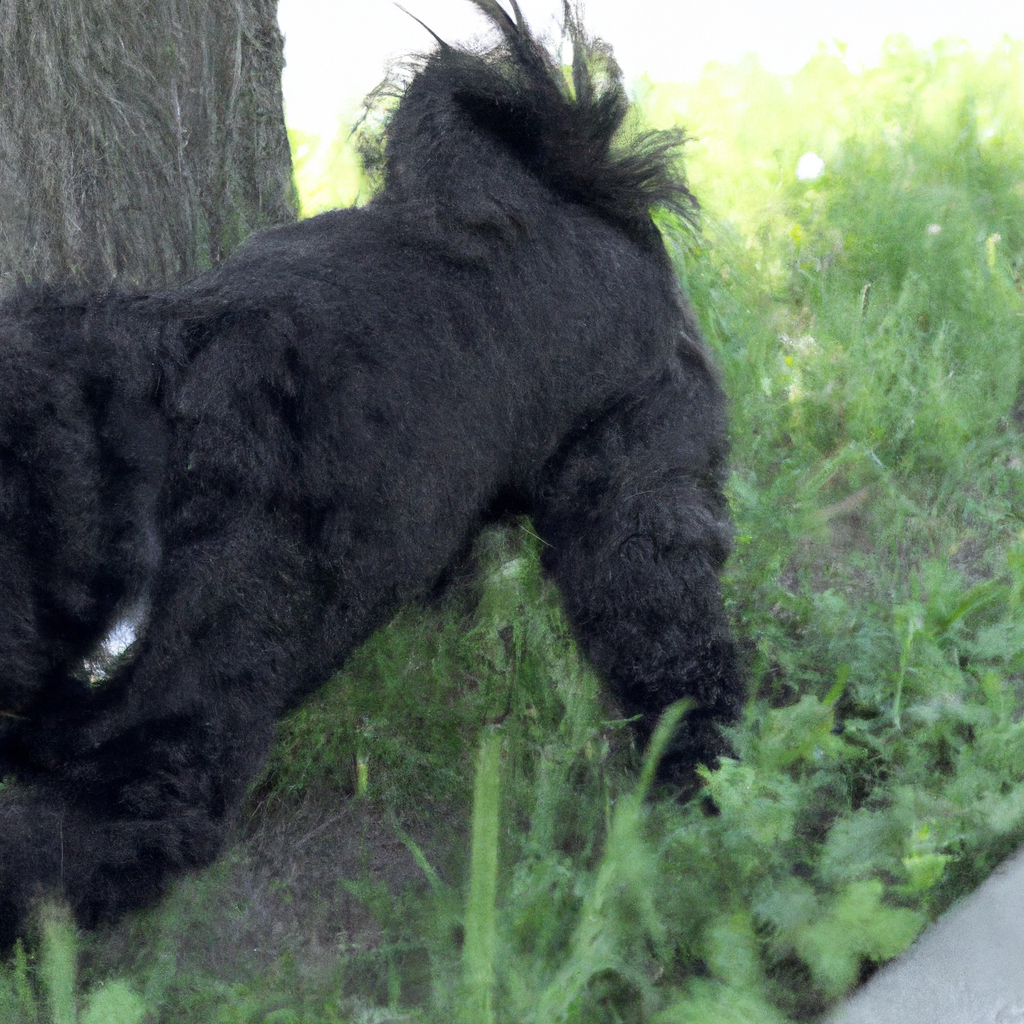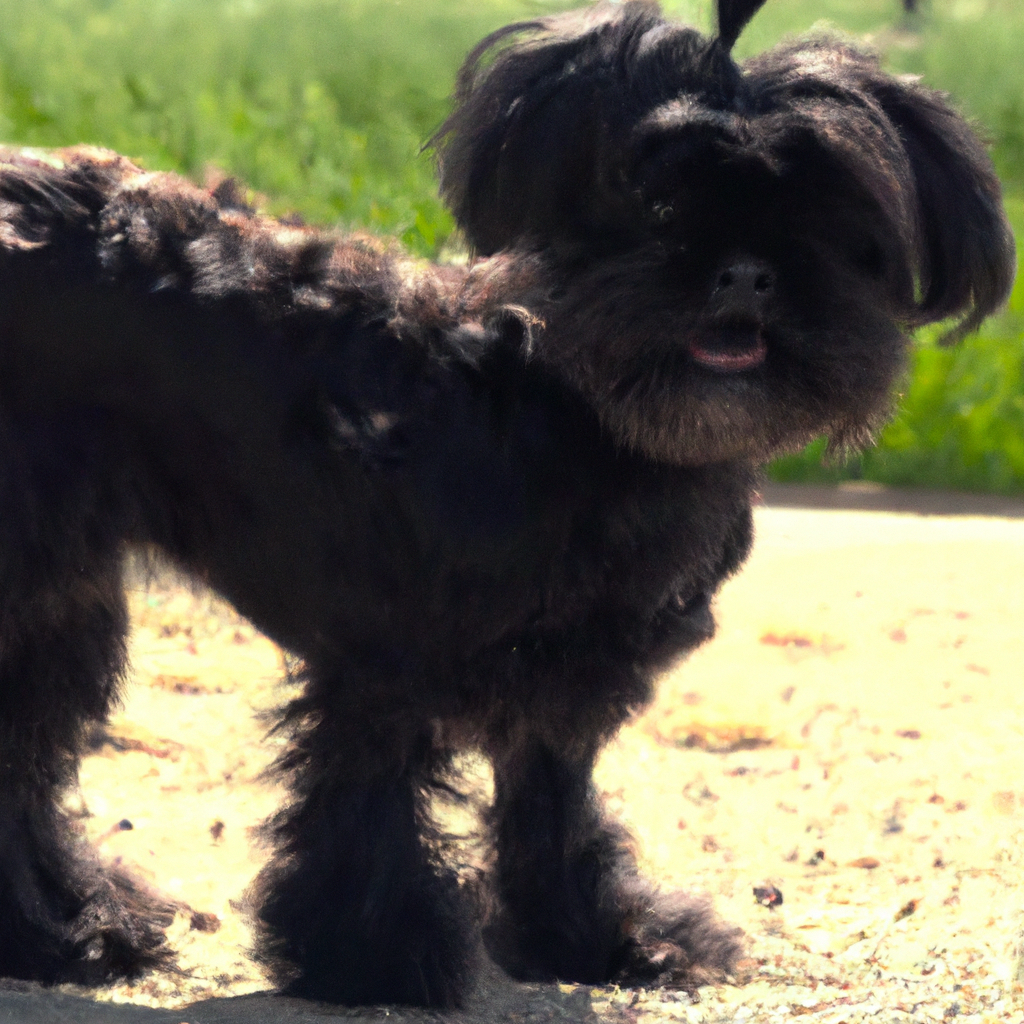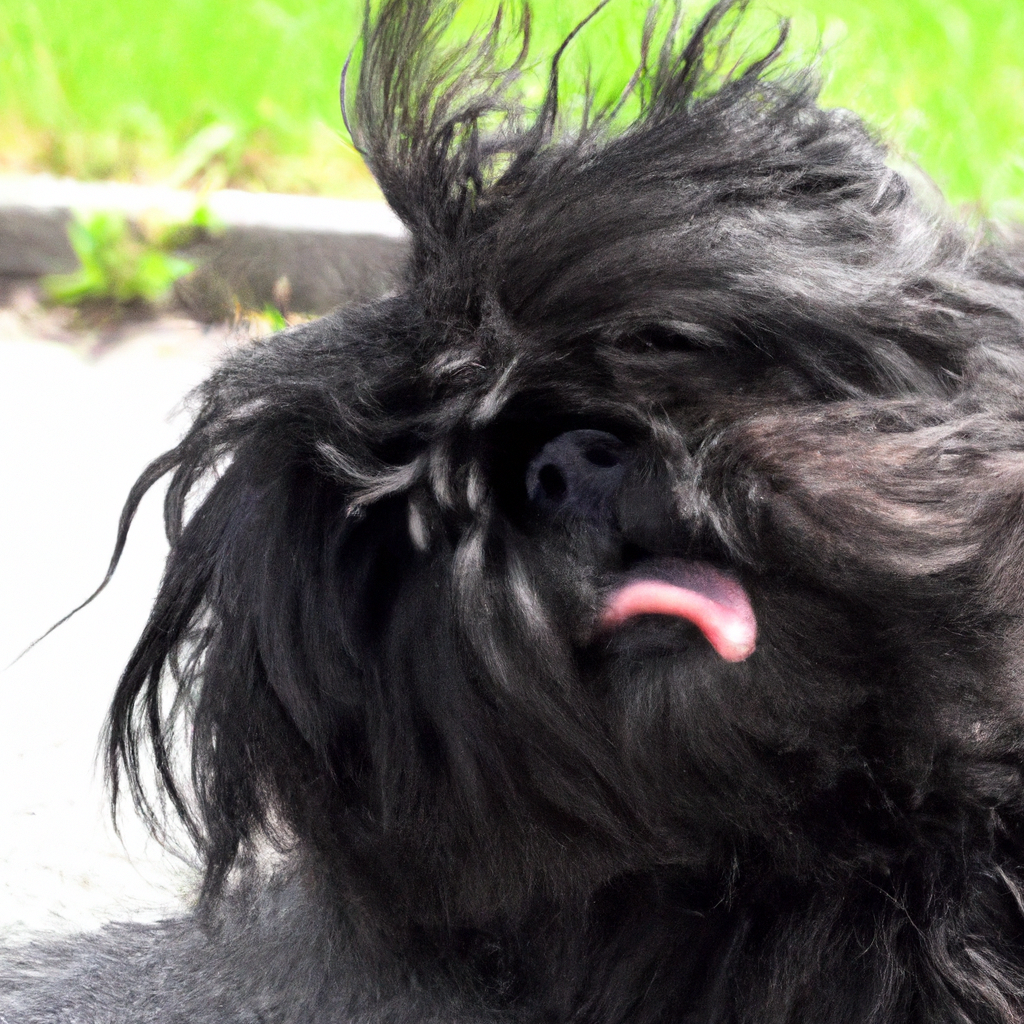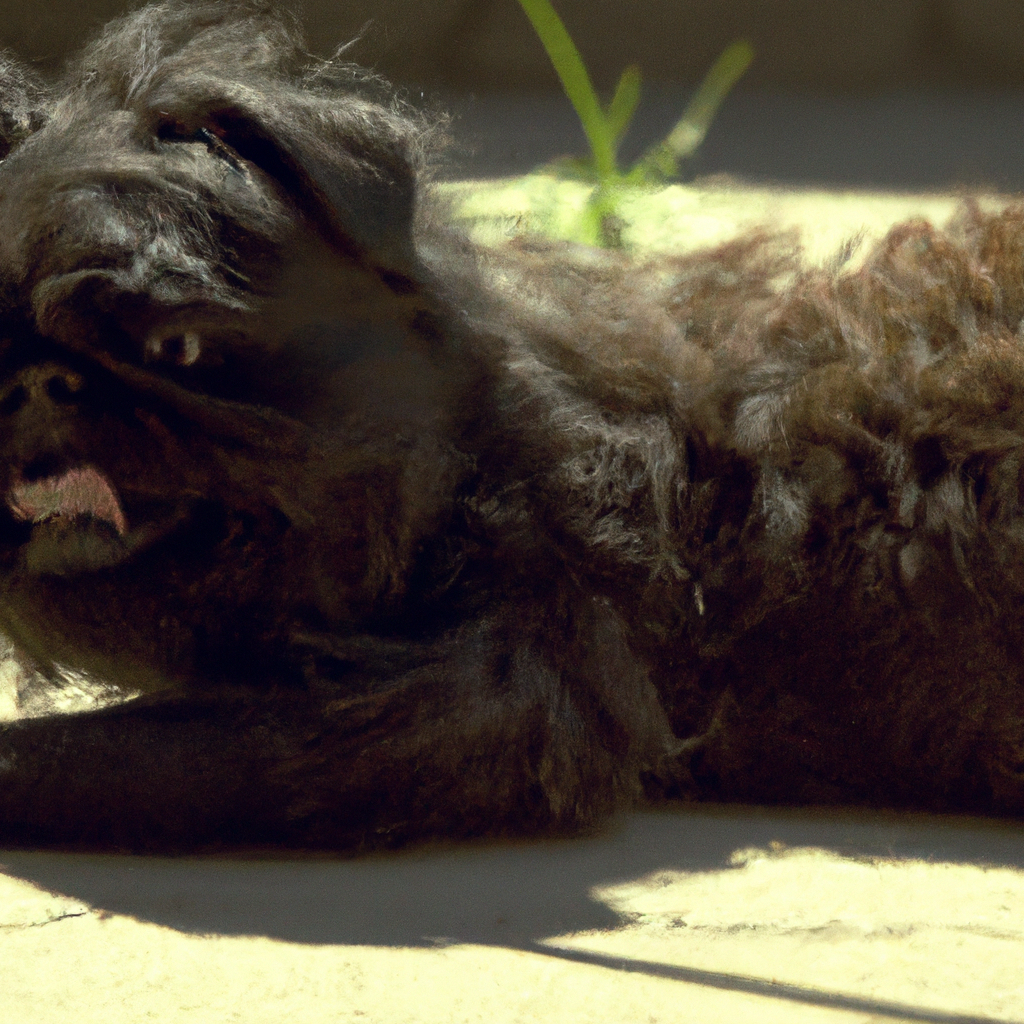Managing an Affenpinscher’s Behaviour during the estrus cycle involves understanding the unique physiological and behavioral changes that this small breed of dog undergoes during this period. The estrus cycle, also known as the heat cycle, can cause significant changes in an Affenpinscher’s behavior, including increased restlessness, aggression, or affectionate behavior. It is crucial for pet owners to be aware of these changes and know how to respond appropriately to ensure the dog’s well-being and maintain a harmonious household environment. This includes monitoring the dog’s health, providing necessary care, and possibly adjusting routines and interactions to accommodate the dog’s altered state.
Understanding the Estrus Cycle in Affenpinschers: Behavioural Changes
Affenpinschers, affectionately known as “Monkey Dogs,” are small, charming, and energetic dogs that are loved for their unique appearance and playful nature. However, if you’re a proud owner of a female Affenpinscher, you may notice some behavioural changes during her estrus cycle, commonly referred to as her “heat” cycle. Understanding these changes can help you manage your pet’s behaviour more effectively and ensure her well-being.
The estrus cycle in Affenpinschers, like in other dog breeds, is a natural process that prepares the female for reproduction. It typically occurs twice a year and is marked by four stages: proestrus, estrus, diestrus, and anestrus. Each stage is characterized by different hormonal changes, which can significantly influence your dog’s behaviour.
During the proestrus stage, which lasts about nine days, your Affenpinscher may become more affectionate and clingy. She may also show signs of restlessness and may urinate more frequently. This is because her body is preparing for potential mating, and these behaviours are designed to attract male dogs.
As we transition into the estrus stage, which lasts about nine days as well, your Affenpinscher’s behaviour may become more pronounced. She may become more flirtatious towards male dogs and may even attempt to mount other dogs or objects. This is the stage where she is most fertile and ready to mate.
Following the estrus stage is the diestrus stage, which lasts about two months. During this time, your Affenpinscher’s behaviour will likely return to normal. However, if she has mated and become pregnant, you may notice signs of pregnancy, such as increased appetite and weight gain.
Finally, the anestrus stage is a period of sexual inactivity that lasts about four to five months. During this time, your Affenpinscher will not show any signs of sexual behaviour.
Understanding these behavioural changes can help you manage your Affenpinscher’s behaviour during her estrus cycle. For instance, during the proestrus and estrus stages, it’s important to keep a close eye on your dog to prevent unwanted pregnancies. This may involve keeping her on a leash during walks and avoiding dog parks or other areas where male dogs may be present.
It’s also important to provide your Affenpinscher with plenty of attention and comfort during this time, as she may be feeling anxious or restless. Regular exercise can also help to alleviate some of these feelings and keep her healthy.
If your Affenpinscher shows signs of extreme discomfort or unusual behaviour during her estrus cycle, it’s always a good idea to consult with a vet. They can provide advice and treatment options to ensure your dog’s health and comfort.
In conclusion, the estrus cycle is a natural part of a female Affenpinscher’s life and can significantly influence her behaviour. By understanding these changes and providing appropriate care and attention, you can help manage your Affenpinscher’s behaviour during this time and ensure her well-being. Remember, every dog is unique, and what works for one may not work for another. Therefore, it’s important to pay close attention to your Affenpinscher’s individual needs and behaviours during her estrus cycle.
Managing Mood Swings in Affenpinschers during the Estrus Cycle
Managing an Affenpinscher’s behaviour during the estrus cycle can be a challenging task for pet owners. This period, often referred to as the ‘heat cycle,’ is a time when female dogs are receptive to mating. It’s a natural process that occurs twice a year and lasts for about three weeks. During this time, your Affenpinscher may exhibit mood swings and behavioural changes that can be quite perplexing. However, with a little understanding and patience, you can effectively manage these changes and ensure your pet’s comfort and well-being.
Affenpinschers, also known as “Monkey Terriers,” are small but feisty dogs known for their playful and adventurous nature. However, during the estrus cycle, you may notice a significant shift in their behaviour. They may become more anxious, irritable, or clingy. Some may even show signs of aggression. This is because their bodies are undergoing hormonal changes, which can affect their mood and behaviour.
One of the first things you can do to manage these mood swings is to provide a calm and comforting environment for your Affenpinscher. This means reducing loud noises, avoiding sudden changes in their routine, and providing them with a quiet, comfortable space where they can retreat if they feel overwhelmed. It’s also important to give them plenty of attention and reassurance during this time, as they may be feeling more vulnerable than usual.
Exercise is another crucial aspect of managing your Affenpinscher’s mood swings during the estrus cycle. Regular physical activity can help to alleviate some of the stress and anxiety they may be feeling. However, it’s important to remember that your pet may not have as much energy as usual during this time, so it’s essential to adjust the intensity and duration of their exercise accordingly.
Diet can also play a role in managing your Affenpinscher’s mood swings. A balanced diet rich in essential nutrients can help to support their overall health and well-being during this challenging time. It may also be beneficial to consult with your vet about any dietary adjustments that may be necessary during the estrus cycle.
It’s also important to remember that your Affenpinscher’s mood swings are temporary and will subside once the estrus cycle is over. However, if you notice any extreme changes in their behaviour or if their mood swings are causing them significant distress, it’s always a good idea to consult with a vet. They can provide you with additional guidance and may be able to recommend treatments or interventions to help manage your pet’s symptoms.
In conclusion, managing an Affenpinscher’s behaviour during the estrus cycle can be a challenging task, but it’s certainly not impossible. By providing a calm and comforting environment, ensuring regular exercise, maintaining a balanced diet, and seeking veterinary advice when necessary, you can help to manage your pet’s mood swings and ensure their comfort and well-being during this time. Remember, patience and understanding are key during this period. Your Affenpinscher is going through a natural process, and with your support, they can navigate it with ease.
Training Techniques for Affenpinschers in Heat
Managing an Affenpinscher’s behaviour during the estrus cycle can be a challenging task for pet owners. This period, often referred to as a dog being ‘in heat’, is when female dogs are receptive to mating. It’s a natural part of a dog’s life cycle, but it can bring about some behavioural changes that may be difficult to manage. However, with the right training techniques, you can help your Affenpinscher navigate this phase with ease.
Firstly, it’s important to understand that an Affenpinscher in heat may exhibit behaviours such as restlessness, frequent urination, and increased affection or clinginess. These behaviours are normal and are a result of hormonal changes. However, they can be managed with patience, understanding, and the right training techniques.
One effective technique is to maintain a consistent routine. Dogs thrive on routine, and this is especially true during the estrus cycle. Regular feeding times, walks, and play sessions can provide a sense of security and help to alleviate some of the restlessness that your Affenpinscher may be experiencing.
Next, consider using positive reinforcement to manage your dog’s behaviour. This involves rewarding your dog for good behaviour, which encourages them to repeat it. For instance, if your Affenpinscher is showing signs of restlessness, try redirecting their energy towards a positive activity, such as a game of fetch or a training session. Once they’ve successfully completed the activity, reward them with a treat or praise. This can help to reinforce the idea that calm, focused behaviour is rewarded.
Another technique is to provide your Affenpinscher with plenty of physical and mental stimulation. This can help to distract them from the hormonal changes they’re experiencing and reduce symptoms such as restlessness or clinginess. Try introducing new toys or puzzle games, or consider enrolling your dog in a training class or doggy daycare. These activities can help to keep your Affenpinscher’s mind and body active, reducing the likelihood of problematic behaviours.
It’s also crucial to remember that your Affenpinscher may be more sensitive during this time. Therefore, it’s important to approach training with patience and understanding. Avoid harsh corrections or punishments, as these can cause stress and anxiety, which may exacerbate behavioural issues. Instead, focus on positive reinforcement and gentle guidance.
Lastly, consider seeking professional help if you’re struggling to manage your Affenpinscher’s behaviour during the estrus cycle. A professional dog trainer or a veterinary behaviourist can provide valuable insight and guidance, helping you to understand your dog’s behaviour and develop effective management strategies.
In conclusion, managing an Affenpinscher’s behaviour during the estrus cycle can be challenging, but it’s certainly not impossible. With patience, understanding, and the right training techniques, you can help your Affenpinscher navigate this phase with ease. Remember, every dog is unique, and what works for one may not work for another. Therefore, it’s important to be flexible and willing to adapt your approach as needed. With time and consistency, you’ll be able to manage your Affenpinscher’s behaviour effectively, ensuring they remain happy and healthy throughout their estrus cycle.
Affenpinscher Behaviour: Coping with the Estrus Cycle
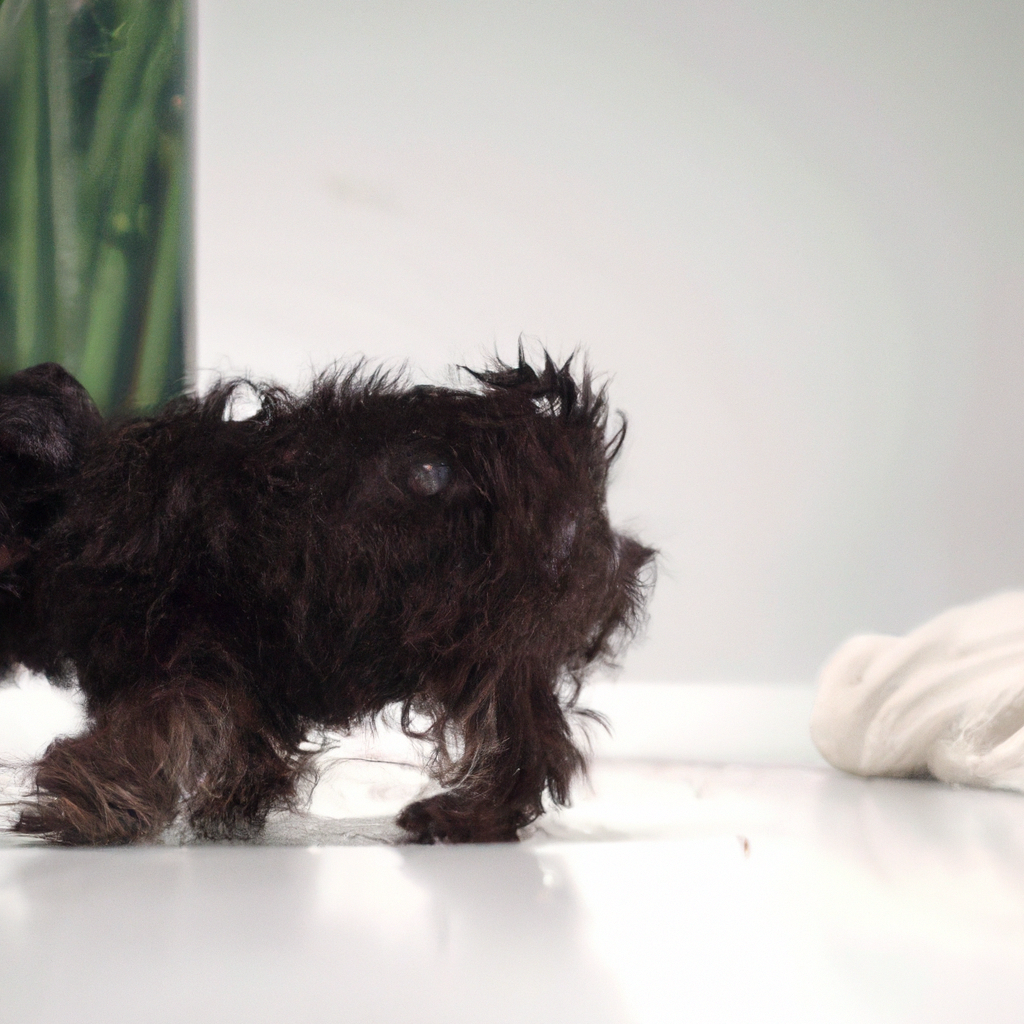
Managing an Affenpinscher’s behaviour during the estrus cycle can be a challenging task for pet owners. The estrus cycle, commonly referred to as the ‘heat cycle’, is a period when female dogs are receptive to mating. This cycle typically occurs twice a year and can last for up to three weeks. During this time, your Affenpinscher may exhibit a range of behaviours that are out of the ordinary, and understanding these changes can help you provide the best care for your pet.
Affenpinschers, like other breeds, may become more restless and anxious during the estrus cycle. They may pace around the house, whine more than usual, and show signs of discomfort. This is due to the hormonal changes they are experiencing. It’s important to remember that these behaviours are normal and are not a cause for concern. However, providing a calm and comforting environment can help alleviate some of their anxiety.
One of the most noticeable changes during the estrus cycle is an increase in urination. Your Affenpinscher may urinate more frequently and in unusual places. This is a natural behaviour as they are marking their territory to signal to potential mates. While it can be frustrating to deal with, it’s crucial to be patient and understanding. Using pet-friendly cleaning products can help manage any messes, and regular walks can help reduce the frequency of indoor accidents.
Another common behaviour during the estrus cycle is a change in appetite. Some Affenpinschers may eat less than usual, while others may eat more. It’s essential to monitor your pet’s eating habits and ensure they are getting the necessary nutrients. If you notice a significant change in appetite or weight, it may be worth consulting with a vet.
Affenpinschers may also become more affectionate or clingy during the estrus cycle. They may seek more attention and physical contact from their owners. While this can be endearing, it’s important to set boundaries and ensure your pet is not becoming overly dependent on you for comfort. Providing toys and engaging in playtime can help distract them and provide a healthy outlet for their energy.
Lastly, it’s important to note that Affenpinschers in heat should not be left unsupervised with male dogs, as this can lead to unwanted pregnancies. If you do not plan on breeding your Affenpinscher, consider spaying her. Spaying not only prevents unwanted pregnancies but also eliminates the estrus cycle and its associated behaviours.
In conclusion, managing an Affenpinscher’s behaviour during the estrus cycle requires patience, understanding, and a bit of preparation. By providing a calm environment, maintaining a regular feeding and walking schedule, and offering plenty of distractions, you can help your pet navigate this challenging time. Remember, every dog is unique, and what works for one Affenpinscher may not work for another. Always consult with a vet if you have concerns about your pet’s behaviour or health during the estrus cycle.
How to Handle Aggression in Affenpinschers during the Estrus Cycle
Managing an Affenpinscher’s behaviour during the estrus cycle can be a challenging task for many pet owners. This period, often referred to as the ‘heat cycle,’ can bring about significant changes in your dog’s behaviour, including increased aggression. Understanding these changes and knowing how to handle them can make this period less stressful for both you and your Affenpinscher.
Affenpinschers, like other breeds, undergo hormonal changes during the estrus cycle, which can lead to mood swings and aggressive behaviour. This aggression can manifest in various ways, such as growling, snapping, or even biting. It’s essential to remember that this is a natural process and your pet is not intentionally trying to be difficult.
The first step in managing this aggression is to understand its triggers. Affenpinschers may become more territorial during the estrus cycle, reacting aggressively to perceived threats to their space. They may also be more sensitive to touch and react negatively to being handled. Observing your pet closely during this time can help you identify these triggers and avoid situations that may provoke aggression.
Once you’ve identified potential triggers, the next step is to manage your pet’s environment to minimise these triggers. For instance, if your Affenpinscher becomes territorial, providing a quiet, private space where they can retreat can help. If they’re sensitive to touch, avoid unnecessary handling and respect their personal space.
Another effective strategy is to maintain a consistent routine. Affenpinschers, like most dogs, thrive on routine. Keeping their feeding, exercise, and sleep schedules consistent can provide a sense of security and help reduce anxiety, which can in turn help manage aggression.
Exercise is another crucial factor in managing aggression. Regular physical activity can help burn off excess energy and reduce restlessness, which can contribute to aggressive behaviour. However, it’s important to remember that Affenpinschers may be more sensitive during the estrus cycle, so it’s best to stick to gentle exercises that won’t overexert them.
Positive reinforcement is also a powerful tool in managing aggression. Rewarding your Affenpinscher for calm behaviour can help reinforce these behaviours and discourage aggression. However, it’s important to avoid punishing your pet for aggressive behaviour, as this can increase anxiety and potentially exacerbate the problem.
Finally, it’s important to remember that patience is key. Managing an Affenpinscher’s behaviour during the estrus cycle can be challenging, but it’s important to remain calm and patient. Your pet is likely feeling stressed and confused, and your calm presence can provide much-needed reassurance.
In conclusion, managing an Affenpinscher’s aggression during the estrus cycle involves understanding the triggers, managing the environment, maintaining a consistent routine, ensuring regular exercise, and using positive reinforcement. It’s a challenging time, but with patience and understanding, you can help your pet navigate this period with minimal stress. Remember, it’s always a good idea to consult with a veterinarian or a professional dog trainer if you’re struggling to manage your pet’s behaviour. They can provide valuable advice and guidance tailored to your pet’s specific needs.
Affenpinscher’s Estrus Cycle: Tips for Effective Management
Affenpinschers, also known as “Monkey Terriers,” are small but feisty dogs known for their distinctive, almost human-like facial expressions. They are generally well-behaved, but like all dogs, female Affenpinschers go through an estrus cycle, commonly referred to as “heat.” This period can be a challenging time for both the dog and the owner, as it often brings about significant behavioural changes. However, with the right approach, managing an Affenpinscher’s behaviour during the estrus cycle can be a smooth process.
The estrus cycle in Affenpinschers, as in other breeds, is a natural biological process that prepares the female dog for reproduction. It typically occurs twice a year and lasts for about three weeks. During this time, you may notice your Affenpinscher becoming more restless, anxious, or even aggressive. She may also urinate more frequently, marking her territory to attract potential mates. These behavioural changes are entirely normal, but they can be disconcerting if you’re not prepared.
One of the most effective ways to manage your Affenpinscher’s behaviour during the estrus cycle is through consistent, gentle training. It’s important to maintain a calm and patient demeanor, as your dog is likely to be more sensitive and reactive during this time. Reward good behaviour with treats and praise, and discourage unwanted behaviours with firm, but gentle corrections. Remember, your Affenpinscher is not acting out of spite or stubbornness; she is simply responding to her hormonal changes.
Another crucial aspect of managing your Affenpinscher’s behaviour during the estrus cycle is ensuring she gets plenty of physical and mental stimulation. Regular exercise can help to burn off excess energy and reduce restlessness, while mental stimulation, such as puzzle toys or training exercises, can help to keep her mind occupied and reduce anxiety. However, it’s important to remember that your Affenpinscher may be more susceptible to distractions during this time, so it’s best to keep her on a leash during walks and to provide a safe, secure environment at home.
In addition to training and exercise, it’s also important to pay attention to your Affenpinscher’s physical comfort during the estrus cycle. She may experience some discomfort or sensitivity, particularly in the genital area. Providing a soft, comfortable bed and avoiding rough play can help to make her more comfortable. It’s also a good idea to invest in doggy diapers or protective pants to manage any spotting or bleeding that may occur.
Finally, it’s important to remember that every Affenpinscher is unique, and what works for one dog may not work for another. It may take some trial and error to find the best approach for managing your Affenpinscher’s behaviour during the estrus cycle. Don’t be afraid to seek advice from your vet or a professional dog trainer if you’re struggling. They can provide valuable insights and tips based on their experience and expertise.
In conclusion, managing an Affenpinscher’s behaviour during the estrus cycle can be a challenge, but with patience, consistency, and a little bit of know-how, it’s entirely manageable. Remember, this is a natural process that your dog is going through, and she needs your understanding and support during this time. With the right approach, you can help your Affenpinscher navigate her estrus cycle with minimal stress and discomfort, ensuring a happy and healthy life for your furry friend.
Dealing with Affenpinscher’s Behavioural Changes during the Estrus Cycle
Managing an Affenpinscher’s behaviour during the estrus cycle can be a challenging task for pet owners. The estrus cycle, commonly known as the heat cycle, is a period when female dogs are receptive to mating. This cycle typically occurs twice a year and can last for up to three weeks. During this time, your Affenpinscher may exhibit a range of behavioural changes that can be quite perplexing if you’re not prepared.
Firstly, it’s important to understand that these behavioural changes are completely natural and are a part of your dog’s reproductive cycle. Your Affenpinscher may become more affectionate and clingy, seeking constant attention and companionship. On the other hand, she may also become more aggressive or irritable, especially towards other dogs. This is because her hormones are fluctuating, causing her to act out in ways that she normally wouldn’t.
One of the most noticeable changes you may observe is an increase in your dog’s urination frequency. This is a way for her to leave scent markers for potential mates. While this is a natural behaviour, it can be problematic if it happens indoors. To manage this, you can increase the number of walks you take each day, giving her more opportunities to mark her territory outside.
Another common behaviour during the estrus cycle is nesting. Your Affenpinscher may start to gather toys, blankets, or other items and arrange them in a specific area of your home. This is a sign that she is preparing for potential puppies. While this behaviour is harmless, it can be a bit messy. To manage this, you can provide her with a designated area where she can nest without disrupting your home.
It’s also not uncommon for your Affenpinscher to lose her appetite during the estrus cycle. This can be concerning, but it’s usually nothing to worry about. However, if she refuses to eat for more than a couple of days, it’s a good idea to consult with your vet.
One of the most challenging behaviours to manage during the estrus cycle is your dog’s increased interest in mating. She may try to escape from your home in search of a mate, which can be dangerous. To prevent this, it’s crucial to keep a close eye on her and ensure that your home and yard are secure.
In addition to these behavioural changes, your Affenpinscher may also experience physical changes such as a swollen vulva and bloody discharge. It’s important to keep her clean and comfortable during this time. You may want to consider using doggy diapers to manage the discharge and prevent staining on your furniture and carpets.
In conclusion, managing an Affenpinscher’s behaviour during the estrus cycle can be a bit challenging, but with patience and understanding, it’s entirely doable. Remember, these changes are temporary and are a part of your dog’s natural reproductive cycle. By providing her with extra care and attention during this time, you can help her navigate through the estrus cycle with minimal stress. And as always, if you have any concerns about your dog’s behaviour or health, don’t hesitate to consult with a vet.
The Impact of the Estrus Cycle on an Affenpinscher’s Behaviour: A Comprehensive Guide
The Affenpinscher, affectionately known as the “Monkey Dog” due to its primate-like appearance and playful nature, is a small but feisty breed. As with all dogs, female Affenpinschers go through an estrus cycle, commonly referred to as “heat.” This cycle can significantly impact their behaviour, and as an Affenpinscher owner, it’s crucial to understand these changes to manage them effectively.
The estrus cycle typically begins when a female Affenpinscher reaches six months of age, although it can vary depending on the individual dog. This cycle occurs approximately twice a year and lasts for about three weeks. During this period, you may notice several behavioural changes in your Affenpinscher.
One of the most noticeable changes is an increase in urination. Your Affenpinscher may urinate more frequently than usual, marking her territory to signal to male dogs that she is in heat. This behaviour is entirely normal, although it can be a bit inconvenient if you’re not prepared for it.
In addition to increased urination, your Affenpinscher may also become more affectionate or clingy during her estrus cycle. She may seek more attention from you and may become anxious or restless if left alone. It’s essential to provide her with plenty of love and reassurance during this time to help her feel secure.
On the flip side, some Affenpinschers may become more aggressive or irritable during their estrus cycle. This behaviour is also a normal part of the cycle, although it can be challenging to manage. If your Affenpinscher becomes aggressive, it’s important to remain calm and patient. Avoid punishing her for this behaviour, as it can increase her stress levels and potentially make the aggression worse.
Another common behaviour during the estrus cycle is nesting. Your Affenpinscher may start to gather toys, blankets, or other items and arrange them in a specific area. This behaviour is a sign that she is preparing for potential puppies, even if she is not pregnant.
Managing these behavioural changes can be a challenge, but there are several strategies that can help. First, ensure that your Affenpinscher gets plenty of exercises during her estrus cycle. Regular walks and playtime can help to burn off excess energy and reduce restlessness.
Second, consider using doggie diapers or pads to manage increased urination. These products can help to protect your furniture and carpets from accidents and can make clean-up easier.
Third, provide your Affenpinscher with a safe and comfortable space where she can retreat if she feels stressed or anxious. This could be a crate, a quiet room, or a special bed.
Finally, if your Affenpinscher’s behaviour becomes particularly challenging, don’t hesitate to seek advice from a professional. A veterinarian or a dog behaviourist can provide valuable insights and strategies to help manage your Affenpinscher’s behaviour during her estrus cycle.
In conclusion, the estrus cycle can significantly impact an Affenpinscher’s behaviour. However, with understanding, patience, and the right strategies, you can effectively manage these changes and ensure that your Affenpinscher remains happy and healthy throughout her cycle.Managing an Affenpinscher’s behaviour during the estrus cycle requires patience, understanding, and consistency. Changes in behaviour such as increased aggression, restlessness, or frequent urination may occur. It’s crucial to provide a safe, comfortable environment and regular exercise to help manage these behaviours. Regular vet check-ups are also essential to ensure the dog’s health during this period.
